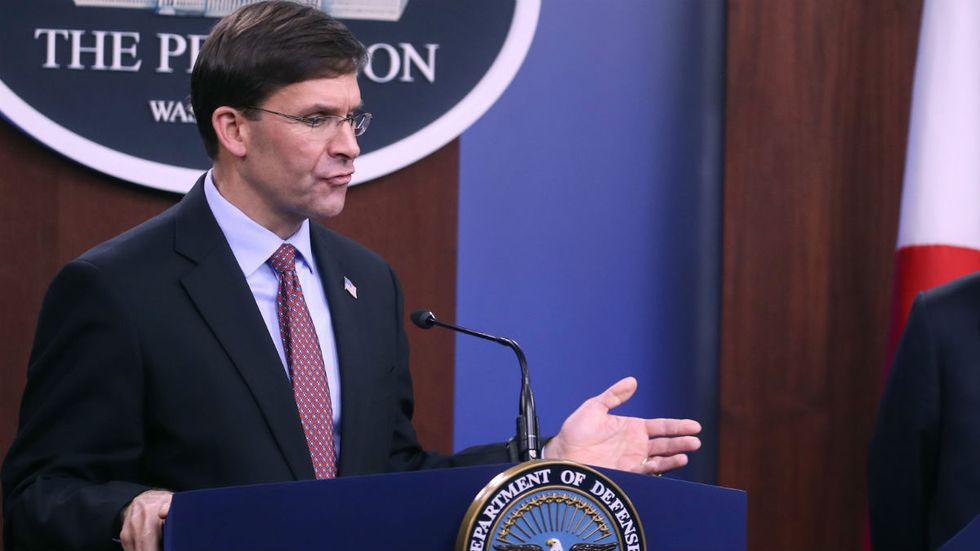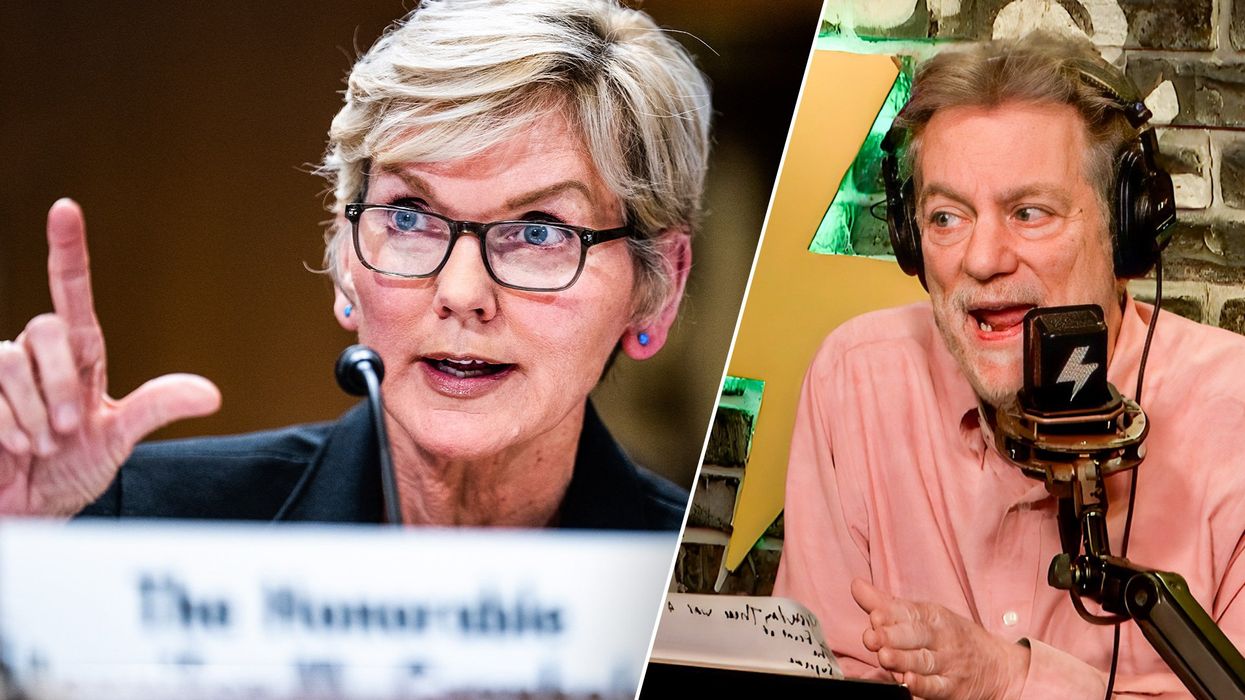
© 2024 Blaze Media LLC. All rights reserved.
‘Extreme vetting’? Trump administration to continue training Saudis on our military bases
January 17, 2020
It is not too much to ask for a process to ensure that those who come into our country as immigrants or on long-term visas actually have a love for this country or, at the very least, not a hatred for it. Indeed, President Trump promised a moratorium on immigration from the Middle East until such a system could be conceived. But now the administration is not even ending the visa program that brings them to our military bases, even after the Pensacola attack.
After a supposedly vetted Saudi military trainee killed three people at Naval Air Station Pensacola, I noted that this would be the perfect time for Trump to fulfill a key campaign promise on immigration, as well as a promise to end the gun-free zone policies. In December 2015, Trump promised a “total and complete shutdown” of Middle Eastern migration “until our country’s representatives can figure out what is going on” and “where this hatred comes from.” Now, following the Pensacola terror attack, the Trump administration is refusing to terminate the Saudi training, much less suspend the broader program, much less suspend any of the hundreds of thousands of long-term visas and green cards given out to nationals of countries where this “hatred” is pervasive.
The Hill reported on Thursday that Secretary of Defense Mark Esper plans to visit the naval base in Pensacola next week and announce new security measures. However, one of those security measures will not be terminating these foreign military training programs. Instead, the DOD will be resuming the training of roughly 850 Saudis after it was temporarily suspended following the attack. In fact, several weeks ago, Esper expressed his desire to grow the program’s enrollment by 50 percent.
Are we really to believe that in just a few weeks’ time, officials have carefully vetted not just the 850 existing Saudi trainees but the several thousand others from countries like Afghanistan? How can we really know the nature of their family ties and whether they subscribe to jihadist views when we missed openly jihadist social media postings of Mohammad Alshamrani, the shooter at Pensacola?
The answer to these questions is further disquieting given that Attorney General William Barr seemed to indicate that we don’t even care about the Sharia supremacist views of those who enter the country for military training, much less as civilians. During Monday’s press conference, the attorney general announced that 21 members of the Saudi military were disenrolled in the training and are being sent back after 17 of them “had social media containing some jihadi or anti-American content” and “15 individuals (including some of the 17 just mentioned) had had some kind of contact with child pornography.”
I expected Barr to continue and declare emphatically that we will not tolerate jihadist sympathizers on our soil, much less on our bases, and that in the future there will be a system of vetting to bring in only those who we can confidently certify are against jihad. Instead, he went on to say that nothing posted was criminal under our laws. “However, the Kingdom of Saudi Arabia determined that this material demonstrated conduct unbecoming an officer in the Saudi Royal Air Force and Royal Navy and the 21 cadets have been dis-enrolled from their training curriculum in the U.S. military and will be returning to Saudi Arabia (later today).”
As Andrew McCarthy observed in a recent column, our government is missing the point about terror threats. It’s not just about vetting visa applicants to see if they are carrying cards that identify them as members of a known terror group. It’s about vetting for the anti-American, Sharia-supremacist mindset.
“Consequently, it has long been known that our capacity to protect America from jihadist attacks hinges on our ability to discourage the infiltration of the political ideology that fuels them, which would necessitate vetting for sharia supremacism and jihadism when foreign Muslims seek to enter the United States,” wrote McCarthy, who studied Islamic ideology carefully as the lead prosecutor in one of America’s earliest Islamic terror trials. “Nevertheless, though the Constitution would not prevent such vetting (there being no constitutional right for an alien to enter the U.S.), our laws, guidelines, and political conditions have made it practically impossible to bar foreigners from entering the United States on ideological grounds. Instead, we draw the line at violence: If it can be shown that an alien has ties to a known terrorist group, or has engaged in terrorist activities, that alien may be denied entry.”
This is the core point made by President Trump in his speech in Ohio on August 15, 2016, when he announced his plan for “extreme vetting.”
“A Trump Administration will establish a clear principle that will govern all decisions pertaining to immigration: we should only admit into this country those who share our values and respect our people,” said then-candidate Trump as he announced a new screening policy. Noting how the recent terror attacks “involved immigrants or the children of immigrants,” Trump was the first Republican to drill down on the need to not only “screen out all members or sympathizers of terrorist groups,” but also “screen out any who have hostile attitudes towards our country or its principles – or who believe that Sharia law should supplant American law.”
Trump again promised “to temporarily suspend immigration from some of the most dangerous and volatile regions of the world that have a history of exporting terrorism,” noting that “the size of current immigration flows are simply too large to perform adequate screening.”
“We admit about 100,000 permanent immigrants from the Middle East every year,” observed Trump. “Beyond that, we admit hundreds of thousands of temporary workers and visitors from the same regions. If we don’t control the numbers, we can’t perform adequate screening.”
The president was so presciently on target. There is simply no way to properly vet just one category of Saudis, much less hundreds of thousands of visa and green-card applicants from the most volatile countries.
Fast-forward three years, and in 2018, by my best estimate, we handed out over 150,000 green cards to nationals of predominantly Muslim countries, not including over 100,000 foreign student visas and other visa categories.
Three years in, if this administration won’t even halt foreign military training programs following the Pensacola terror attack, this is yet another immigration promise that is headed for the ash heap of history, unless conservatives gently but firmly remind the president of his continued opportunity to fulfill it.
Want to leave a tip?
We answer to you. Help keep our content free of advertisers and big tech censorship by leaving a tip today.
Want to join the conversation?
Already a subscriber?
Blaze Podcast Host
Daniel Horowitz is the host of “Conservative Review with Daniel Horowitz” and a senior editor for Blaze News.
RMConservative
more stories
Sign up for the Blaze newsletter
By signing up, you agree to our Privacy Policy and Terms of Use, and agree to receive content that may sometimes include advertisements. You may opt out at any time.
© 2024 Blaze Media LLC. All rights reserved.
Get the stories that matter most delivered directly to your inbox.
By signing up, you agree to our Privacy Policy and Terms of Use, and agree to receive content that may sometimes include advertisements. You may opt out at any time.



